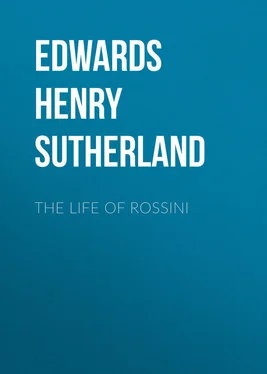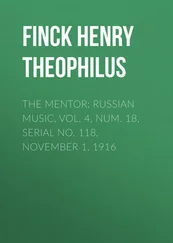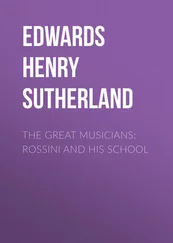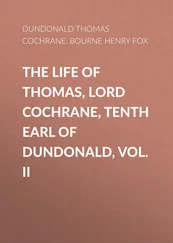Henry Edwards - The Life of Rossini
Здесь есть возможность читать онлайн «Henry Edwards - The Life of Rossini» — ознакомительный отрывок электронной книги совершенно бесплатно, а после прочтения отрывка купить полную версию. В некоторых случаях можно слушать аудио, скачать через торрент в формате fb2 и присутствует краткое содержание. Жанр: foreign_antique, foreign_prose, на английском языке. Описание произведения, (предисловие) а так же отзывы посетителей доступны на портале библиотеки ЛибКат.
- Название:The Life of Rossini
- Автор:
- Жанр:
- Год:неизвестен
- ISBN:нет данных
- Рейтинг книги:4 / 5. Голосов: 1
-
Избранное:Добавить в избранное
- Отзывы:
-
Ваша оценка:
- 80
- 1
- 2
- 3
- 4
- 5
The Life of Rossini: краткое содержание, описание и аннотация
Предлагаем к чтению аннотацию, описание, краткое содержание или предисловие (зависит от того, что написал сам автор книги «The Life of Rossini»). Если вы не нашли необходимую информацию о книге — напишите в комментариях, мы постараемся отыскать её.
The Life of Rossini — читать онлайн ознакомительный отрывок
Ниже представлен текст книги, разбитый по страницам. Система сохранения места последней прочитанной страницы, позволяет с удобством читать онлайн бесплатно книгу «The Life of Rossini», без необходимости каждый раз заново искать на чём Вы остановились. Поставьте закладку, и сможете в любой момент перейти на страницу, на которой закончили чтение.
Интервал:
Закладка:
Without proposing to imitate those conscientious historians who cannot chronicle the simplest events of their own time without going back to the origin of all things, I may perhaps find it more easy to explain to the unlearned reader what Rossini did in the way of perfecting operatic forms if I previously mark down the steps in advance taken by his predecessors.
The first operas seem to have been little more than spoken dramas interspersed with choruses in the madrigal style. “Dafne,” performed for the first time in the Corsi palace in 1597, passes for the first opera musicale in which recitative was employed.
In “Euridice,” represented publicly at Florence on the occasion of the marriage of Henry IV. of France with Marie de Medicis in 1600, each of the five acts concludes with a chorus, the dialogue is in recitative, and one of the characters, Tircis , sings an air which is introduced by an instrumental prelude. Here, then, in germ, are the overture, the chorus, the air, the recitative of modern opera.
Monteverde (1568 – 1643), who changed the whole harmonic system of his predecessors, gave greater importance in his operas to the accompaniments, increased the number of musicians in the orchestra, and made use of a separate combination of instruments to announce the entry and return of each dramatic personage – an orchestral device which passes in the present day for new.
Scarlatti (1649 – 1745), who studied in Rome under Carissimi, gave new development to the operatic air, and introduced measured recitative. Scarlatti’s operas contain the earliest examples of airs with obbligato solo accompaniments, and this composer must always hold an important place in the history of the opera as the founder of the great Neapolitan school.
Alessandro Scarlatti was followed by Logroscino and Durante; 5 5 Durante passed from one Conservatory at Naples to another, and was necessarily professor at all three.
the former of whom introduced concerted pieces and the dramatic finale, which was afterwards developed by Piccinni, and introduced into serious opera by Paisiello; while the latter succeeded his old master, contemporaneously with Leo, as professor at Naples, where Jomelli, Piccinni, Sacchini, Guglielmi, Paisiello, and Cimarosa, were formed under his guidance.
The special innovations of Piccinni and Paisiello have been mentioned. Cimarosa, without inventing or modifying any particular form, wrote the best overtures that the Italian school had yet produced, and was the first to introduce concerted pieces in the midst of dramatic action.
We have seen that Rossini was a pupil of the Bologna Lyceum; but though he was the first great Italian composer who never studied at the Conservatories of Naples, to him fell all the rich inheritance of the Neapolitan school.
CHAPTER III
FOUR HISTORICAL OPERAS
IN bringing forward Monteverde, Scarlatti, Durante, Logroscino, and Pergolese, Jomelli, Piccinni, Paisiello, and Cimarosa, as the founders of opera, one seems to be tracing operatic history merely through names. To opera goers, who do not limit the sphere of their observation to London, it would be simpler to cite four examples of works belonging to the century before Rossini, which, if not living in the full sense of the word, are, at least, capable of revival, and have been presented to the public in their revived state during the last few years.
Pergolese’s “Serva Padrona,” an opera or operetta of the year 1731, was reproduced at Paris in 1862, for the début of Madame Galli-Marié. In this little work, which passed for its composer’s masterpiece, the accompaniments are all for stringed instruments, and as there are only two speaking characters in the drama, it naturally follows that all the musical pieces are of the simplest form. But when “La Serva Padrona” was produced, a composer, however many characters he might have to deal with, was not expected to go in the way of concerted pieces beyond a duet; and it was not until twenty years afterwards that Logroscino ventured upon a trio, and upon the first very simple model of the dramatic finale.
In Gluck’s “Orfeo” we have a well-known specimen of an opera, somewhat later in date, and much more advanced in regard to dramatic form, than the one just named. It must be remembered that “Orfeo” was originally produced in 1764, not in France, but in Italy. In Gluck’s operas we find an abundance of recitative; airs; choruses taking part in the dramatic action; occasionally duets; very rarely concerted pieces, and never finales. Gluck, like his rival Piccinni, but certainly not more than Piccinni, extended the limits of operatic art. If, as is generally admitted, he excelled in his dramatic treatment of chorus and orchestra, he neglected concerted pieces, and was not equal to the handling of those grand dramatic finales which Piccinni was the first to produce, in anything like their modern form, which Paisiello naturalised in serious opera, and which were brought to perfection in both styles by the comprehensive genius of Mozart.
A third opera by a præ-Mozartian composer, which, as it is still occasionally represented, may be cited for the further progress it exhibits in the development of operatic forms, is Cimarosa’s “Matrimonio Segretto.” Before writing this, one of his latest works (1792), its composer had been already completely distanced by Mozart, who adopted all that was worth adopting in the methods of all his contemporaries and predecessors; but to Cimarosa all the same belongs the merit of having introduced quartets and other concerted pieces, not as ornaments at the end of an act, but as integral parts of the musical drama. This important innovation occurs for the first time in Cimarosa’s “Il fanatico per le antichi Romani,” composed in 1773, thirteen years before the production of the “Marriage of Figaro.”
Cimarosa’s “Matrimonio Segretto” is also remarkable in an historical point of view for its overture, the finest that the Italian school had up to that time produced. Paisiello’s overture to the “Frascatana” had previously made a decided mark; but Rossini was the first composer of his nation who wrote a whole series of operatic overtures – “Tancredi,” “Barber of Seville,” “Gazza Ladra,” “Semiramide,” “Siege of Corinth,” “William Tell” – which became celebrated apart from the works to which they are prefixed.
The only opera of Paisiello’s which has been presented in recent times, is his original musical setting of the “Barber of Seville,” written in 1780 for the Court Theatre at St. Petersburgh. This interesting work, which was revived a couple of years ago, and is still occasionally played at one of the half dozen musical theatres in Paris called Les Fantaisies Parisiennes, is anterior to Mozart, more even in character than by date. Produced twenty years before “Il Matrimonio Segretto,” and only six years before the “Marriage of Figaro,” it seems very much further removed from Mozart’s than from Cimarosa’s work. Mozart went so far beyond his contemporaries that he may almost be described as a great anticipator. Like Shakspeare he is much more modern than his immediate successors.
However Paisiello’s “Barbiere” may sometimes be heard, and is therefore better worth speaking of than works of equal or greater importance, which can only be looked at on paper; and it is interesting as marking a stage in the history of opera by the number and merit of its concerted pieces.
The opera, then, was at first nothing but recitative, or recitative and chorus; the chorus having no dramatic character, but confining itself, in imitation of the most ancient models, to solemn criticism and comment. To relieve the drawling recitative or chant, an occasional air was introduced; then more airs; then airs and duets. We have to wait until the middle of the eighteenth century for a simple trio. Then trios, quartets, finales, fully developed finales, occur. In the meantime Gluck had given great prominence to the chorus, and had cultivated choral writing with the happiest dramatic effect; and while operatic forms, especially in regard to the employment of the voices, had been gradually varied and extended by the Italians, the instrumental writers of Germany, more especially Haydn, had invented new orchestral combinations. Mozart appeared; and appropriating all in music that had gone before – joining to all the vocal forms of the Italians all the instrumental forms of the Germans, while improving, developing, and perfecting both – helped dramatic music on to that point at which even now, speaking broadly, it may be said to remain.
Читать дальшеИнтервал:
Закладка:
Похожие книги на «The Life of Rossini»
Представляем Вашему вниманию похожие книги на «The Life of Rossini» списком для выбора. Мы отобрали схожую по названию и смыслу литературу в надежде предоставить читателям больше вариантов отыскать новые, интересные, ещё непрочитанные произведения.
Обсуждение, отзывы о книге «The Life of Rossini» и просто собственные мнения читателей. Оставьте ваши комментарии, напишите, что Вы думаете о произведении, его смысле или главных героях. Укажите что конкретно понравилось, а что нет, и почему Вы так считаете.












